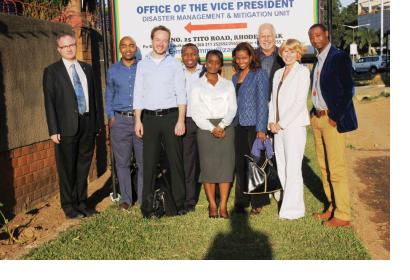UN-SPIDER and its team of experts carried out a Technical Advisory Mission (TAM) to Zambia from 26 to 30 May 2014. The TAM was conducted upon invitation of the Office of the Vice-President, Disaster Management and Mitigation Unit (DMMU).
The team met with about 15 key stakeholder agencies in the country including the Survey Department, the Meteorological Service or the National Remote Sensing Centre. The experts took stock of issues such as policy gaps, availability of satellite data and geospatial information for all relevant institutions, the current use of space-based information in the country, and data sharing practice. The team also looked at challenges and constraints, existing capacity and further training needs, established institutional linkages and ways to strengthen disaster risk reduction and emergency response at the country level.
As a first follow up of the TAM, information was shared on data collection and very high resolution data acquisition options, seeing the high interest of the host institutions to work immediately on the implementation of the agreed recommendations. Meetings were also extended to various UN agencies with disaster-management responsibilities locally, and presentations on best practices were made at a workshop at the end of the mission.
A full profile of the mission including its main outcomes will be published on the Knowledge Portal, once available.

